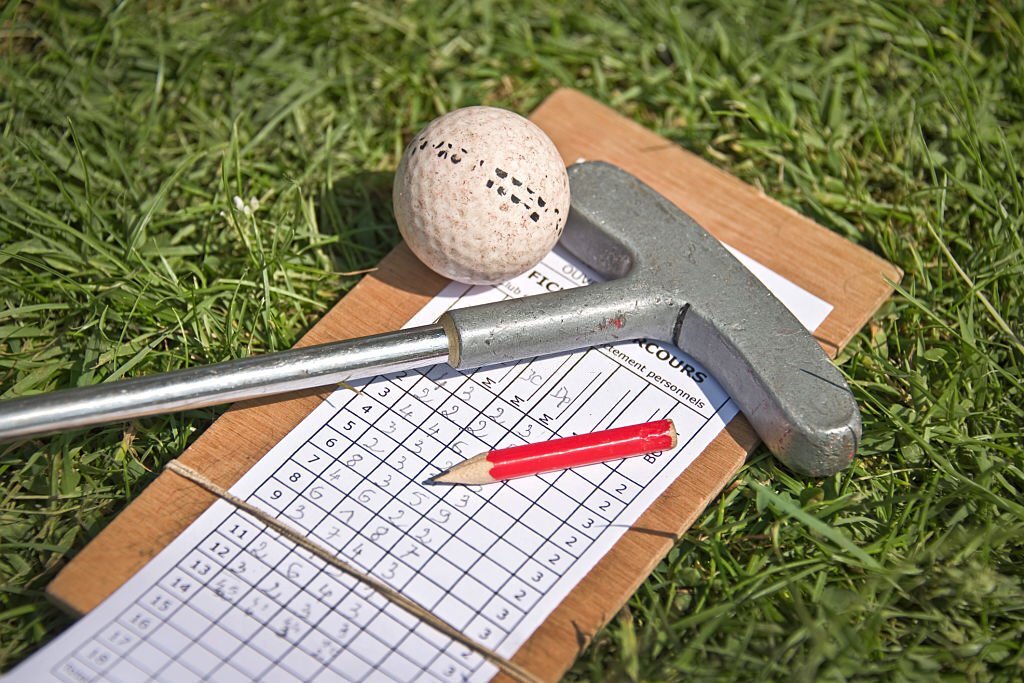Are you an avid golfer looking to improve your game? One essential factor that can help you track your progress and level the playing field is understanding how to calculate your golf handicap. In this blog post, we’ll break down the ins and outs of golf handicaps, from what they are to how you can calculate yours. So grab your clubs and let’s dive in!
Understanding Golf Handicap
To calculate your golf handicap, you need to know your average score. The handicap is adjusted based on the difficulty of the course, known as AGS. By using a formula that takes into account 20 scores and the AGS, you can determine your handicap accurately.
Knowing your golf handicap allows you to compete fairly with players of different skill levels and provides a clear indicator of your overall performance.
The purpose of a golf handicap is to level the playing field by allowing players of different skill levels to compete fairly. It allows for friendly competition among golfers and provides an indicator of their overall performance. By calculating your average score and adjusting it based on the course difficulty, you can have a better understanding of where you stand in terms of skill level in relation to other players.
What is a Golf Handicap?
A golf handicap is a numerical measure of a golfer’s potential skill level. It allows players of different abilities to compete against each other on an equal footing. Golf handicaps are calculated using the USGA Handicap System, which takes into account a player’s average score and adjusts it based on the difficulty of the courses they play.
- Definition of golf handicap
- How golf handicaps are calculated
- USGA Handicap System

Why is Golf Handicap Important?
The golf handicap is important because it levels the playing field, allowing fair competition between players of different skill levels. By adjusting scores based on a player’s handicap, everyone has an equal chance to win. Additionally, the handicap helps track improvement and progress by calculating an average score over time. This allows players to see how they are performing compared to their past performances and set goals for future games.
Calculating Your Golf Handicap
Step 1: Determine Your Handicap Index
Understanding the Handicap System is essential when determining your Handicap Index. It allows golfers of different skill levels to compete fairly by adjusting their scores based on the difficulty of the course. To calculate your Average Score, add up your total score from several rounds and divide it by the number of rounds played. Once you have this average, you can use it along with other factors like Slope Rating and Course Rating to find your Handicap Index.
Step 2: Calculate Your Course Handicap
Using the Course Handicap Formula, calculate your Course Handicap by multiplying your Handicap Index by the Slope Rating of the course and dividing it by 113. Adjust this number for playing conditions such as wind, rain, or firmness of greens. Consider any Stroke Allocation based on the tees you are playing from and refer to the USGA’s recommended handicap stroke tables for accurate scoring adjustments.
Step 3: Adjusting for Course Difficulty
Using the USGA Course Rating System:
- Familiarize yourself with the USGA Course Rating System, which assigns a difficulty rating to each course based on factors such as length and obstacles.
Incorporating Factors like Elevation and Wind Speed:
- Take into account additional factors that can affect the difficulty of a golf course, such as elevation changes and wind speed.
Applying Multipliers or Deductors:
- Adjust your handicap calculation by applying multipliers or deductors based on specific conditions of the course, like extreme weather or temporary modifications.
Using Your Golf Handicap
When playing in competitions, your golf handicap is a crucial factor to consider. It helps level the playing field and allows players of different skill levels to compete fairly. By calculating your handicap accurately, you can determine your net score and compare it to other players’ scores, giving everyone an equal chance at victory.
Playing with Friends: Even when not competing formally, knowing and using your golf handicap can enhance friendly games among friends. With handicaps taken into account, you can adjust the number of strokes each player receives based on their skill level. This creates a more balanced match and ensures that everyone has an enjoyable experience on the course regardless of their individual abilities.
Playing in Competitions
Understanding the Handicap System is essential for playing in golf competitions. It allows players of different skill levels to compete on a level playing field. Your Course Handicap is calculated based on the difficulty of the course you’re playing, ensuring fair competition. When participating in a competition, apply your Handicap to your scores to determine your net score and compare it with other players.

Playing with Friends
Determining Each Player’s Course Handicap
- To determine each player’s course handicap, you need to find their Handicap Index and the course rating.
- Use a golf handicap calculator or consult the USGA Golf Handicap System to compute the course handicap.
Using the Handicaps to Level the Playing Field
- Once you have determined each player’s course handicap, use it to level the playing field in friendly matches.
- Subtract each player’s course handicap from their total score at the end of a round for fair and balanced competition.
Adjusting Scores for Fair and Fun Matches
- Adjust scores by using net scoring instead of gross scoring in friendly matches with friends.
- Net scores allow players of different skill levels to compete on an equal footing, making games more enjoyable.
Improving Your Golf Handicap
Practice and play regularly to improve your golf handicap. By consistently getting out on the course, you’ll have more opportunities to refine your skills and develop a better understanding of the game. Dedicate time each week to practice different aspects of your game, from driving off the tee to putting on the green.
Seek professional coaching for personalized guidance in improving your golf handicap. A qualified instructor can assess your technique, provide valuable tips, and help you identify areas that need improvement. Their expertise will allow you to make necessary adjustments in order to enhance your overall performance.
Analyze your game by keeping track of key statistics such as fairways hit, greens in regulation, and putts per round. This data will reveal patterns and highlight areas where you can focus on making improvements. Additionally, reviewing video recordings of yourself playing can provide valuable insights into any flaws or inconsistencies within your swing mechanics.
Remember that improving your golf handicap takes time and dedication. Stay committed to practicing regularly, seeking professional coaching when needed, and analyzing every aspect of your game for continuous growth as a golfer.

Practice and Play Regularly
Create a consistent practice schedule to make the most of your training time. Dedicate specific days and times each week to focus on improving your golf game. This regularity will help you develop good habits and maintain progress.
Focus on different aspects of your game during each practice session. Instead of aimlessly hitting balls, have a plan in mind. Work on your putting one day, then concentrate on driving or iron shots the next. By targeting specific areas, you can hone your skills more effectively.
Play regularly to improve your overall performance. Getting out on the course regularly allows you to put what you’ve practiced into action and gain valuable experience in different situations. The more rounds you play, the better equipped you’ll be for various challenges that arise during gameplay.
Seek Professional Coaching
Research and find a reputable golf coach or instructor. Their expertise and guidance can greatly improve your game.
Schedule regular coaching sessions to receive personalized guidance. Consistent practice with a professional will help you develop the necessary skills.
Work with the coach to identify areas for improvement in your game. By focusing on specific weaknesses, you can target them effectively and see significant progress.
Analyze Your Game
Track your scores and statistics during rounds of golf to get a clear picture of your performance. By diligently recording this information, you can identify patterns or trends in your game over time. Utilize online tools or smartphone apps that calculate and monitor your handicap index, providing valuable insights into how you’re progressing as a golfer.











